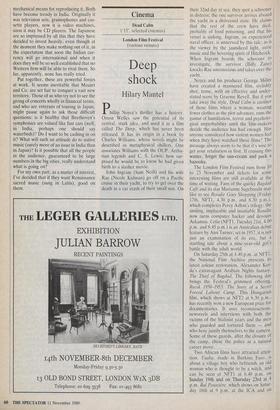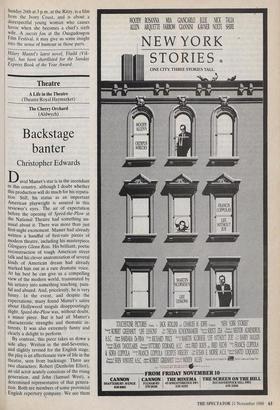Cinema
Dead Calm (`15', selected cinemas)
Deep shock
Hilary Mantel
Phillip Noyce's thriller has a history. Orson Welles saw the potential of its central, stark idea, and used it in a film called The Deep, which has never been released. It has its origin in a book by Charles Williams, whose novels might be described as metaphysical chillers. One associates Williams with the OUP, Arthu- rian legends and C. S. Lewis; how sur- prised he would be to know he had given birth to a slasher movie.
John Ingram (Sam Neill) and his wife Rae (Nicole Kidman) go off on a Pacific cruise in their yacht, to try to get over the death in a car crash of their small son. On their 32nd day at sea, they spot a schooner in distress; the one survivor arrives aboard the yacht in a distressed state. He claims that the rest of the crew have died, probably of food poisoning, and that his vessel is sinking. Ingram, an experienced naval officer, is unnerved by this tale; as is the viewer by the jaundiced light, eerie music and the hovering spirit of Hitchcock. When Ingram boards the schooner to investigate, the survivor (Billy Zane) knocks Rae unconscious and takes over the yacht.
Noyce and his producer George Miller have created a mannered film, stylishly shot, tense, with an effective and under- stated score by Graeme Revell. But if you take away the style, Dead Calm is another of those films where a woman, wearing fewer clothes as the plot advances, runs the gamut of humiliation, terror and psycholo- gical improbability until the film-makers decide the audience has had enough. Has anyone considered how violent women feel when they have watched these films? The message always seem to be that it's wise to get your retaliation in first. If cruising this winter, forget the sun-cream and pack a bazooka.
The London Film Festival runs from 10 to 23 November and tickets for some interesting films are still available at the time of writing. Fans of the quirky Bagdad Cafe and its star Marianne Sagebrecht may like to see Rosalie Goes Shopping (Friday 17th, NFT1, 4.30 p.m. and 8.30 p.m.), which completes Percy Adlon's trilogy; the smiling, implacable and insatiable Rosalie now turns computer hacker and devours Arkansas. Celia (NFT1, Tuesday 21st, 4.00 p.m. and 8.45 p.m.) is an Australian debut feature by Ann Turner; set in 1957, it is not just an examination of its era, but a startling tale about a nine-year-old girl's battle with the adult world.
On Saturday 25th at 4.40 p.m. at NFT1, the National Film Archive presents its latest colour restoration, Alexander Kor- da's extravagant Arabian Nights fantasy, The Thief of Bagdad. The following day brings the Festival's grimmest offering, Recsk 1950-1953: The Story of a Secret Forced Labour Camp. This Hungarian film, which shows at NFT2 at 6.30 p.m., has recently won a new European prize for documentaries. It uses reconstructions, newsreels and interviews with both the victims of the Stalinist years and the men who guarded and tortured them — and who here justify themselves to the camera. Some of these guards, after the closure of the camp, chose the police as a natural career move.
Two African films have attracted atten- tion. Yaaba, made in Burkina Faso, is about a village boy who befriends an old woman who is thought to be a witch, and can be seen at NFT1 at 6.40 p.m. on Sunday 19th and on Thursday 23rd at 4 p.m. Bal Poussiere, which shows on Satur- day 18th at 9 p.m. at the ICA and on Sunday 26th at 3 p.m. at the Ritzy, is a film from the Ivory Coast, and is about a disrespectful young woman who causes havoc when she becomes a chief's sixth wife. A succes fou at the Ouagadougou Film Festival, it may give us some insight into the sense of humour in those parts.
Hilary Mantel's latest novel, Fludd (Vik- ing), has been shortlisted for the Sunday Express Book of the Year Award.











































































 Previous page
Previous page